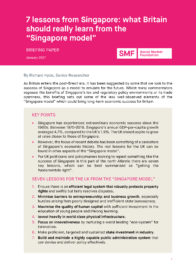It has often been suggested that Britain should look to Singapore for a post-Brexit economic blueprint. Whilst many commentators espouse the benefits of the city-state's tax, regulatory and trade environments, this briefing highlights some of the less well-observed elements of the “Singapore model” which could bring long-term economic success for Britain.
Key points
- Singapore has experienced extraordinary economic success since the 1960s. Between 1970-2019, Singapore’s annual GDP-per-capita growth averaged 4.7%, compared to the UK’s 1.9%. The UK should aspire to grow at rates closer to those of Singapore.
- However, the focus of recent debate has been something of a caricature of Singapore’s economic history. The real lessons for the UK can be found in other aspects of the “Singapore model”.
- For UK politicians and policymakers looking to repeat something like the success of Singapore in this part of the north Atlantic there are seven key lessons, which can be best summarised as ”getting the fundamentals right”.
Seven lessons for the UK from the “Singapore model”
- Ensure there is an efficient legal system that robustly protects property rights and swiftly but fairly resolves disputes.
- Minimise barriers to entrepreneurship and business growth, especially hurdles arising from poorly designed and inefficient state bureaucracy.
- Maximise the quality of human capital with sufficient investment in the education of young people and lifelong learning.
- Invest heavily in world class physical infrastructure.
- Focus on innovativeness by nurturing a world leading “eco-system” for innovation.
- Make proficient, targeted and sustained state investment in industry.
- Build and maintain a highly capable public administration system that can devise and deliver policy effectively.

Download The Report: PDF
